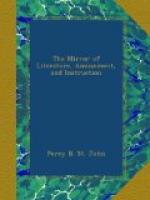by each party, till the earl being “put to great
streights for the maintenance of his family,”
petitioned the house of peers for relief, and Lord
Viscount Campden having been the principal instrument
in the ruin of the “castle, lands, and woods
about Belvoyre,” parliament agreed that 1,500l
a year be paid out of Lord Campden’s estate,
until 5,000l be levied, to the earl of Rutland.
In the civil wars the castle was defended for the
king by the rector of Ashwell, co. Rutland.
In 1649, the parliament ordered it to be demolished;
satisfaction was, however, made to the earl, whose
son rebuilt the castle after the Restoration.
John, the ninth earl, succeeded his father in 1679.
He preferred the baronial retirement and rural quiet
of Belvoir, to the busy court; though he was created
Marquess of Granby, in the county of Nottingham, and
Duke of Rutland. He died in 1710-11, and was succeeded
by his son John;[4] whose eldest son became the third
Duke of Rutland, and was the last of the family who
resided at Haddon, Derbyshire. He died in 1779,
and was succeeded by his grandson, Charles, Lord Ros,
fourth duke, who died lord lieutenant of Ireland in
1787, when his son John Henry, the present and fifth
duke succeeded to the titles and estates.
[3] As illustrative of the folly and superstition of the times, it may be interesting to explain this. Joan Flower, and her two daughters, who were servants at Belvoir Castle, having been dismissed the family, in revenge, made use of all the enchantments, spells, and charms, that were at that time supposed to answer their malicious purposes. Henry, the eldest son, died soon after their dismissal; but no suspicion of witchcraft arose till five years after, when the three women, who are said to have entered into a formal contract with the devil, were accused of “murdering Henry Lord Ros by witchcraft, and torturing the Lord Francis, his brother, and Lady Catharine, his sister.” After various examinations, before Francis Lord Willoughby, of Eresby, and other magistrates, they were committed to Lincoln gaol. Joan died at Ancaster, on her way thither, by wishing the bread and butter she ate might choak her if guilty. The two daughters were tried before Sir Henry Hobbert, Chief Justice of the Common Pleas, and Sir Edward Bromley, one of the Barons of Exchequer, confessed their guilt, and were executed at Lincoln, March 11, 1618-19.
[4] “The great Marquess of Granby” born in 1721, was the son of this duke. During the rebellion he raised a regiment of foot. In 1758, being lieutenant-general, he was sent into Germany, and eminently distinguished himself under Prince Ferdinand of Brunswick. He died in 1770, and was buried with his ancestors at Bottesford, where, a few years since, there was no monumental record of his name!
It is now time to speak of the present magnificence of Belvoir. The castle which surrounds a quadrangular court, occupies nearly the summit of the hill, which




